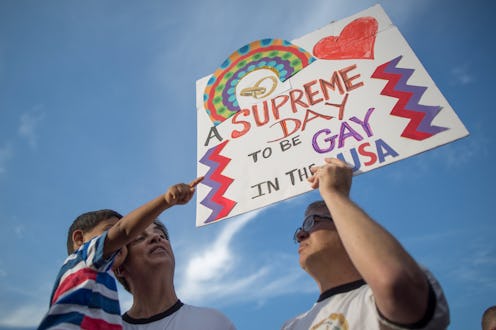News
South Dakota's Anti-Gay Adoption Law Could Hurt The Whole State

Earlier this month, South Dakota Governor Dennis Daugaard signed into law SB 149, a bill that critics argue is anti-LGBT. Specifically, LGBT advocates fear that the law will allow foster care and adoption agencies to deny services to LGBT families in South Dakota. Under the new law, any "faith-based or religious child placement agency or organization" that contracts with the state retains its independence with regard to "decisions as to whether any child-placement service conflicts with any sincerely-held religious belief or moral conviction of the agency."
Like the First Amendment Defense Act or Religious Freedom Restoration Act, SB 149 permits organizations — in this case, child placement agencies — to refuse to provide services on the basis of religious belief. "SB 149 allows taxpayer-funded adoption and foster care agencies to turn away prospective parents, just because of their sexual orientation, gender identity, or religion," Sejal Singh, Campaigns & Communications Manager at the Center for American Progress, tells Bustle.
"What this bill means," says Singh, "is that is that same-sex couples could be turned away at the door when they try to adopt or foster." This could potentially have a serious impact on child placement in South Dakota, since same-sex couples are six times likelier to foster children than heterosexual ones, and four times likelier to adopt. With an estimated 1,200 children in the South Dakota foster care system, enabling religiously based organizations to eliminate LGBT families from consideration could have a damaging — and lasting — impact.
SB 149 has also attracted criticism from other local governments. On Monday, the City of San Francisco announced that it will no longer contract with South Dakota businesses or permit its employees to travel there for work — and the state of California is reportedly considering blocking state-subsidized travel there as well.
Libby Skarin, policy director at ACLU South Dakota, tells Bustle that SB 149 is part of a pattern of proposed legislation in South Dakota "targeting" LGBT people: "In the last three, four, five years, every single legislative session, we see some attack on LGBT people and their right to just exist peacefully in our state and not be discriminated against."
Skarin also suggests that the wording of the bill might permit agencies to discriminate not only against same-sex couples, but also potentially against LGBT children seeking placement or other potential parents.
"Anything, under this bill, could qualify as a 'religious belief,'" she explains. "I do believe that the intent behind this bill was to target LGBT people, but again, when you’re talking about these really broadly written bills, I think this law would allow these agencies to turn away anyone who doesn’t fit into what their religious beliefs are, whether we're talking about a single parent who wants to adopt, someone who's been divorced, an interfaith couple, people who are of the 'wrong religion.'"
Singh echoes Skarin's concerns that families of other religions could face discrimination. "If a child placement agency decided they only wanted to place children among people who shared their religion, and someone who was Jewish or Muslim came to them to adopt a child, they could be turned away - again, consistent with SB 149," she says.
Taxpayer dollars are going toward discrimination that the taxpayers don’t support.
The text of SB 149 does not explicitly mention the sorts of people or qualities that might violate an organization's religious beliefs, although it does explicitly prohibit discrimination based on ethnicity, race, or national origin. South Dakota lawmakers who backed the bill, however, dispute that the new law will enable any discrimination.
SB 149 raises different questions from, say, allowing a baker to turn away a same-sex couple looking for a wedding cake, because it applies to agencies that receive public funding.
"Taxpayer dollars are going toward discrimination that the taxpayers don’t support," Singh tells Bustle, pointing to Public Religion Research Institute survey data indicating that the majority of Americans — including majorities of Americans in almost every faith and denomination — do not support permitting businesses to refuse to serve LGBT people on religious grounds.
These things matter on a national scope, and when these bills pass anywhere, it's easier for them to pass in more states.
Kelsey Pritchard, spokeswoman for Daugaard, told the Argus Leader that "neither the state nor any agency with a state contract discriminates in adoptions or foster care."
One sponsor, Rep. Steven Haugaard, disputed that the bill would negatively affect South Dakotans. In an email to Bustle, Haugaard said:
The purpose of the law is to provide protection to faith based agencies to ensure that they can continue to offer the services to children and families that they have offered for decades. There is nothing in SB 149 that prohibits the state, other public or private agencies, or any of the nearly 2000 attorneys in South Dakota from arranging placements and/or adoptions for anyone who seeks placement or adoption of a minor. The law is readily available for anyone to read. It is unfortunate that anyone would read it and claim that it creates something that is not there.
The law, which you can read here, explicitly states that child placement agencies "retain independent control" over "decisions as to whether any child-placement service conflicts with any sincerely-held religious belief or moral conviction of the agency." South Dakota law, moreover, does not explicitly protect LGBT people from discrimination
Similar bills are currently making their way through state legislatures in Alabama, Oklahoma, and Texas. What initially seems like a single law in a small state could ultimately have far-reaching, national implications for the future of adoptive and foster families in the United States.
As Skarin says, "These things matter on a national scope, and when these bills pass anywhere, it's easier for them to pass in more states."